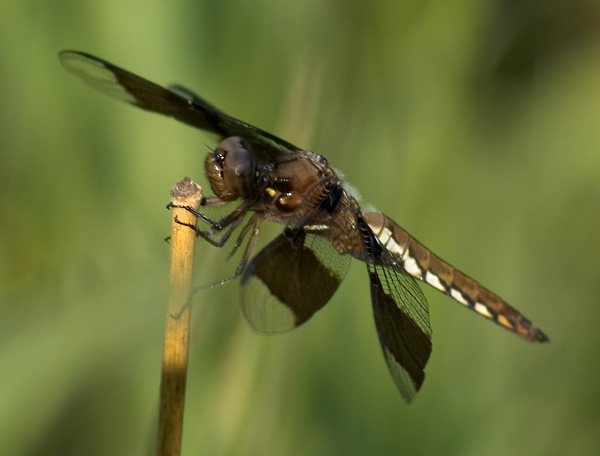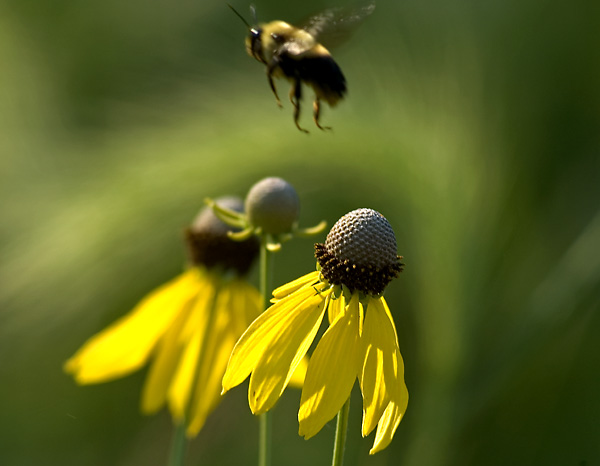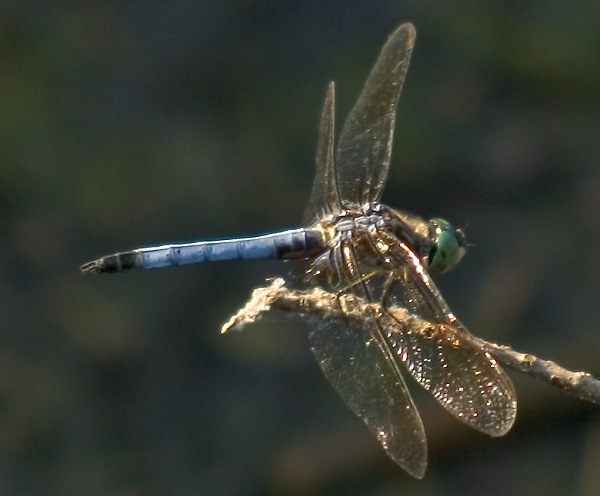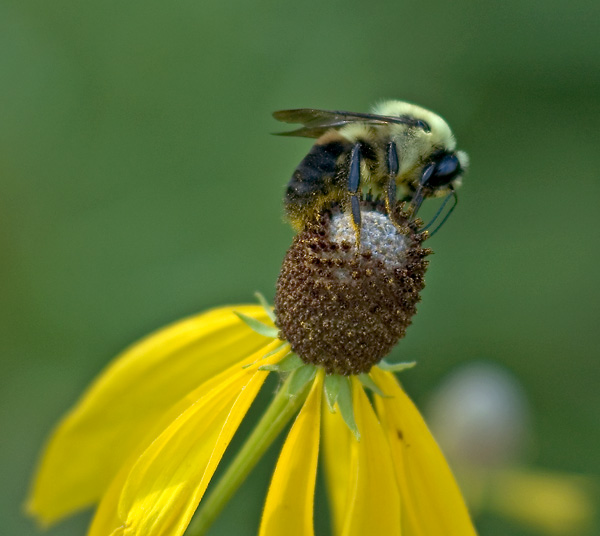As the old saying goes in the Ozarks, we’re always two weeks away from a drought.
I’ve been following Dr. Jeff Master’s weblog at Weather Underground, as he covers Hurricane Dennis, the strongest July hurricane in this country since records have been maintained. Last night and today, folks are being evacuated in Florida and Alabama, and from Dr. Master’s recent Saturday evening post, it’s a good thing they were:
I urge all residents of the Gulf Coast in Alabama and the Florida Panhandle who were undecided about whether to evacuate to get out now!
Dennis continues to break the rules for what is usual for a hurricane. In my previous blog entry, I wrote that it is very unusual for a major hurricane to regain its former intensity after a long crossing over land. However, Dennis is poised to do just that.
Dennis continues to break the rules for what is usual for a hurricane. As timing would have it, I happened to read this just before putting on a film I checked out from Netflix, the British Science Fiction classic, “The Day the World Caught Fire”.
The story is told from the perspective of a reporter and a London-based newspaper room, filmed in a genuine newspaper office. In the film, the world is knocked out of its orbit from atomic blasts, but the news is kept from the populace. All they know is that the weather has changed, and changed drastically. It’s an extremely powerful movie, and even somewhat uncomfortable to watch. I can see now why many equate it with “The Day the Earth Stood Still”, as one of the finest science fiction movies of all time. What the older British science fiction movies lacked in Playtex Living Monsters, they definitely made up for in suspense and realism.
But I digress. To return to the reality of our own unreal weather, Dr. Masters just wrote another post saying that it’s probably too late, now, to evacuate in the Florida Panhandle. To just sit tight–Dennis is about to hit as a strong category 3, weak category 4 storm.
Hurricane, high winds, and flooding advisories have been issued across several states, and even we in Missouri had a ‘heads up’ because there is a good possibility that Dennis will follow the Mississippi Valley and hit both Illinois and Missouri, passing through Arkansas and Tennessee on the way. Unlike Mississippi, Florida, Georgia, and Alabama, though, we in Arkansas, Missouri, and Illinois are delighted to welcome Dennis to our homes–even with the risk of flooding. We’re now in the midst of what has been declared to be an extreme drought, as the weather monitor map shows.
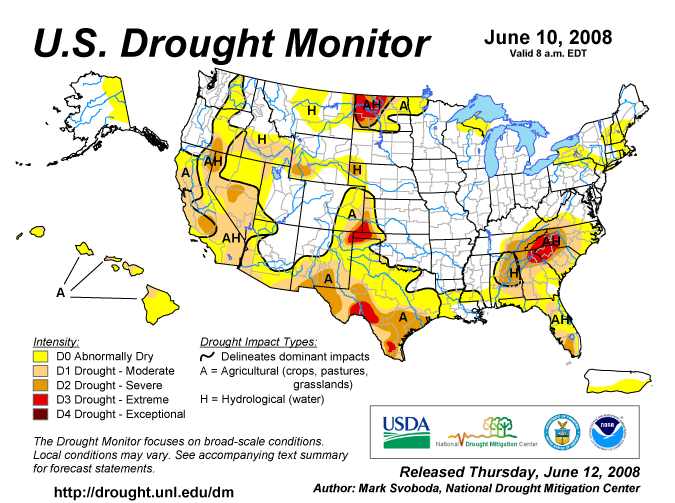
Dennis is the fourth major tropical story this year, and it’s only a couple of weeks into hurricane season. This is not a good sign for a part of the country that’s still trying to recover from being so badly hit last year. It doesn’t seem like the folks that area have been getting many breaks lately.
We inland have also not been getting any breaks in the weather, either, though we’re not at risk for such devastating loses and potential (but hopefully no) loss of life. It’s sadly ironic, though, that the cause of many people’s despair along the Gulf is the root of some hope in this region. We don’t wish anyone harm, but we need the rain.
The bear I ran into a few weeks back was most likely displaced by the drought. Black bears are ranging farther afield, and have even been swimming the Mississippi into other states. As good as this is for propagation efforts, it also increases the likelihood of a confrontation between bear and human, most likely to the detriment of the bear.
Important grain crops such as corn and soybean are suffering, which means food could be going up in price, and some countries could be going hungry. Economically, this in an area already suffering unemployment and poverty, and now more agricultural workers could be laid off. In addition, many of the farms in this Midwest area are still owned by small farmers, most of whom can’t take a really bad year and stay afloat.
Our hills are at risk for fire, and its probably only a matter of time before we have a major fire. The forests are already suffering from clear cutting in the 1800’s, and another deforestation will have long term consequences to the viability of the Ozark forest. A big story out of the Ozarks last year is the sighting of a previously thought extinct woodpecker. All it could take would be one fire to push this rare bird back into the extinct lists…for good.
Even river traffic is impacted. This year marks the seventh in a drought that’s impacted on the flow of water in the Missouri river, leading to a battle in the US Senate between those who are up-river and those who are down. Missouri is ‘down’ river in case you’re curious. The upriver folks in states like Montana want to hold more of the Missouri’s water in dams, while the downriver want more released.
Though Hurricane Dennis won’t impact on the Missouri River drought, it will on the Mississippi, also running lower than normal. That’s the real danger of lowering Missouri water flow: its impact on the Mississippi, which is fed by northern rivers. Unlike the Missouri, which never did support much in the way of modern river traffic, the Mississippi River is essential to the transportation of agricultural and other products.
Most of us are also dependent on the rivers for our own personal water use, in addition to water for our crops and forests. I just read that the folks in East St. Louis have been issued boil water notices. On the other hand, the lower levels of water in the Meramec have led to better than average fishing, as these Bosnians, I believe they are, found out yesterday, though one ended up losing half his pole when his line got caught up on rocks.

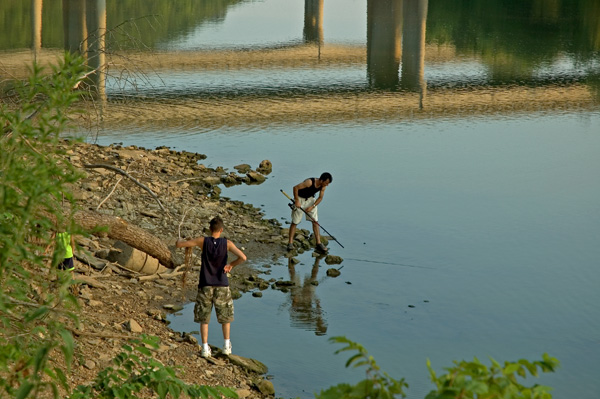
To add injustice to the irony, even if we do get significant moisture from Dennis, enough to provide a decent supply of water, we could be looking at flooding as the water hits on sun-baked dirt, hard as a rock. In addition, Dennis could bring with it the Asian Soybean rust, a virulent fungus that could impact on an already impacted soy crop. As farmers in the region say, though, we’ll deal with things as they come. So we’ll take the rain and worry about the rust, later.
Dennis is going to hit any time now. I wish there was something we could do to help the folks in the region, other than send along our thoughts.
In the meantime, between checking the ‘casts, I spent time yesterday at Shaw Nature Center, which is along the most northern part of the Ozarks. The region isn’t as badly impacted by the drought, but you can see it in the trees and plants: leaves already dropping, plants drooping, flowers opened too early. Normally in a Missouri summer, you can stand in a forest and hear life beating around you. Yesterday, it was silent. The rain coming in will help. Might even be enough to save the monarch migration.
